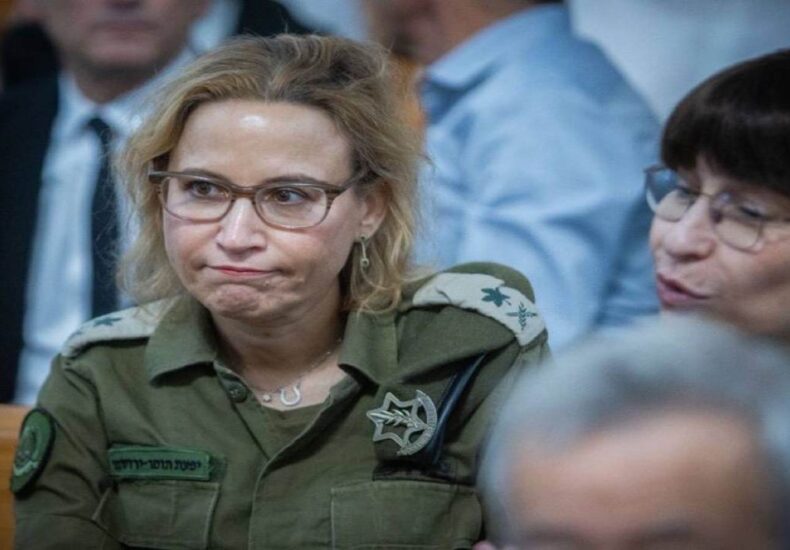
A Leaked Video, a Missing Official, and a Political Firestorm, Inside Israel’s Growing Military Scandal
Fundacion Rapala – In a dramatic twist, Maj. Gen. Yifat Tomer-Yerushalmi, once Israel’s top military lawyer, is now at the center of a national crisis. A week ago, she was enforcing the rule of law in the Israel Defense Forces (IDF). Now she faces arrest for allegedly leaking a shocking video that shows Israeli soldiers abusing Palestinian detainees at the Sde Teiman military prison. The video includes claims of sexual assault and brutal mistreatment. Its release has shaken Israel’s military and political systems, raising questions about justice, leadership, and accountability. What started as a legal investigation into misconduct has evolved into one of Israel’s most explosive scandals in years.
How the Scandal Began
The story traces back to July 2024, when IDF legal authorities opened an investigation into soldiers accused of assaulting detainees during the Gaza war. The footage allegedly captured a Palestinian prisoner being assaulted while others lay restrained on the ground. When Channel 12 aired parts of the video in August 2024, public outrage followed immediately. Earlier, CNN and several Israeli whistleblowers had exposed similar abuse at Sde Teiman. Although Israel later promised to close the facility, no major reforms occurred. By then, far-right politicians had turned the investigation into a political battle. Crowds gathered outside military courts, defending the accused soldiers as national heroes rather than offenders.
“Read More : King Charles Finally Banishes His Brother But Is It Too Little, Too Late?”
The Fall of Yifat Tomer-Yerushalmi
For months, Tomer-Yerushalmi had faced fierce criticism from Israel’s right-wing politicians. As the Military Advocate General, she led prosecutions against soldiers accused of misconduct. That role made her a target for those who saw her actions as disloyal to the army. When the Sde Teiman investigation expanded, the attacks on her intensified. Last week, Attorney General Gali Baharav-Miara opened a criminal probe into the leaked footage, forcing Tomer-Yerushalmi to resign. In her resignation letter, she admitted authorizing the video’s release but insisted she acted to ensure transparency. She also condemned the “campaign of incitement” against her and warned that it harmed the army’s integrity. “There are things that cannot be done, even to the worst detainees,” she wrote.
Political Reactions and Public Outrage
The political fallout was immediate. Defense Minister Israel Katz demanded that Tomer-Yerushalmi lose her rank, accusing her of spreading a “blood libel” against Israeli soldiers. Prime Minister Benjamin Netanyahu described the leak as “the worst PR disaster in Israel’s history.” National Security Minister Itamar Ben-Gvir went even further, calling her conduct “criminal behavior disguised as legality.” He demanded an independent prosecutor to investigate her actions. Within days, the controversy moved beyond the military, becoming a national argument over ethics, patriotism, and the rule of law. For many Israelis, the scandal symbolizes a country deeply divided over how far justice should reach in wartime.
“Read More : GOP Oversight: Autopen Pardons ‘Void’? What the Final Report Says and What It Doe”s”n’t
A Sudden Disappearance and Arrest
Just when the scandal seemed to reach its peak, another twist emerged. On Sunday morning, Tomer-Yerushalmi disappeared. Police and military teams launched an urgent search across central Israel. Later that evening, they found her on a beach near Tel Aviv. Authorities arrested her for fraud, obstruction of justice, breach of trust, and abuse of power. Investigators believe she misled the High Court and senior military officials about the video’s release. They also suspect she submitted false statements to conceal her role. Four other senior military lawyers are under investigation for helping cover up the leak. The arrest shocked Israel’s legal community, intensifying debates about integrity within the army’s justice system.
The Legal Battle and Deepening Political Divide
The case has triggered open conflict between Israel’s judiciary and its right-wing government. Justice Minister Yariv Levin accused Attorney General Baharav-Miara of having a conflict of interest and demanded her removal. He suggested she may have been involved in the leak. Baharav-Miara’s office dismissed the accusation, calling Levin’s actions an “unlawful attempt to obstruct justice.” Legal experts warned that the dispute threatens Israel’s already fragile balance of power. According to one senior lawyer in Jerusalem, “This is no longer just about a video. It’s about whether the legal system can function without political interference.” The scandal has become a test of Israel’s democratic resilience and its ability to separate law from politics.
Broader Implications for Israel’s Image
Beyond the legal drama, the scandal has damaged Israel’s global reputation. Human rights organizations have long criticized the country’s treatment of Palestinian detainees, and the leaked footage added visual proof to those claims. International observers now see the case as a reflection of Israel’s internal struggle between justice and nationalism. Domestically, it has reignited debates over the limits of military authority and the moral cost of occupation. For supporters of Tomer-Yerushalmi, she is a symbol of courage a woman who chose integrity over conformity. For her critics, she represents betrayal. Either way, the affair has exposed deep ethical and institutional fractures within Israel’s democracy.
What Lies Ahead for Israel’s Military and Justice System
As of this week, Tomer-Yerushalmi remains under investigation, awaiting a court hearing. She has not been charged yet, and her legal team has stayed silent. Meanwhile, the Palestinian detainee featured in the leaked footage has returned to Gaza under a U.S.-brokered ceasefire, complicating future prosecutions. Observers believe the case will influence Israel’s military policies and its relationship with international law. It may also determine whether accountability can survive in a system under growing political pressure. Whatever the outcome, this scandal marks a turning point. It has shown that even the most powerful figures in Israel’s defense establishment are not immune to scrutiny or controversy.